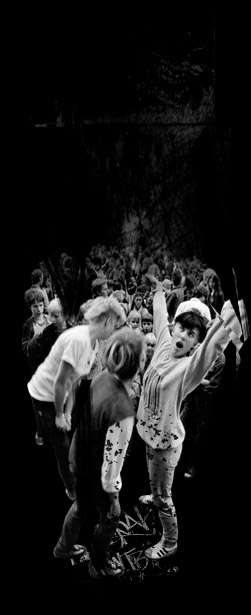|

Whenever a more or less interested media is turning to the subject of punk in the GDR it usually doesn't get much further than mentioning the name "Feeling B", a legendary trash band that didn't even understand itself as punk. Cream of the crop are usually "Die Skeptiker" (the sceptics) who didn't live up to their name at all when in 1989 during a show together with the band "Herbst In Peking" (Autumn In Peking) they would refuse to take part in a silent minute to commemorate those murdered on Beijing's Tiananmen Square. Quite compliant to the state for a band with such a name.
It's not widely known that there had been a first generation of punkbands active that by 1984 - when those bands nowadays considered as sole examples for GDR punk were just starting - had been destroyed by the Stasi. Those latter bands can be found on East punk compilations such as "Sicher gibt es bessere Zeiten, doch dies war die unsere" (Sure there's better times, but this was ours). Those bands aren't very representative for the GDR punk scene. The bands of the first generation have hardly been heard or mentioned. To name but a few: "Rosa Extra", "Namenlos", "Wutanfall", "Koks", "Planlos", "Unerwünscht", "Zwitschermaschine" und "Sendeschluß".
The compilation will be dedicated to the legacy of these bands. They existed under much harder conditions than those bands performing after 1984. The extent of their prosecution was much bigger, by 1984 the authorities acted against the by then hard to survey punk scene with a mix of oppression and corruption. This is one reason for the lyrics before 1984 being more explicit which resulted in a complete surveillance of the bands. The bands following this first geneartion could count on the authorities' helpless attempts to keep things under control. These bands could deal with the tense situation in almost playful and liberal ways. The existence of those bands could be viewed as a calculated risk, whereas the few bands from the early days were often used to be made an example of. The changed situation after 1984 was partly due to the fact that the punk scene of the second half of the 80s was much bigger and thus harder to survey, which meant that the authorities couldn't focus on single members of a small scene anymore like they used to.
At the moment we're looking for a lable that will respect our freedom concerning the selection of the compilation and furthermore is willing to back-up the manufacturing efforts we're aiming for: gatefold sleeve, printed inner sleeve, picture labels, bonus single etc. We ourselves are quite curious how much of our plan we will be able to realize.
 |



